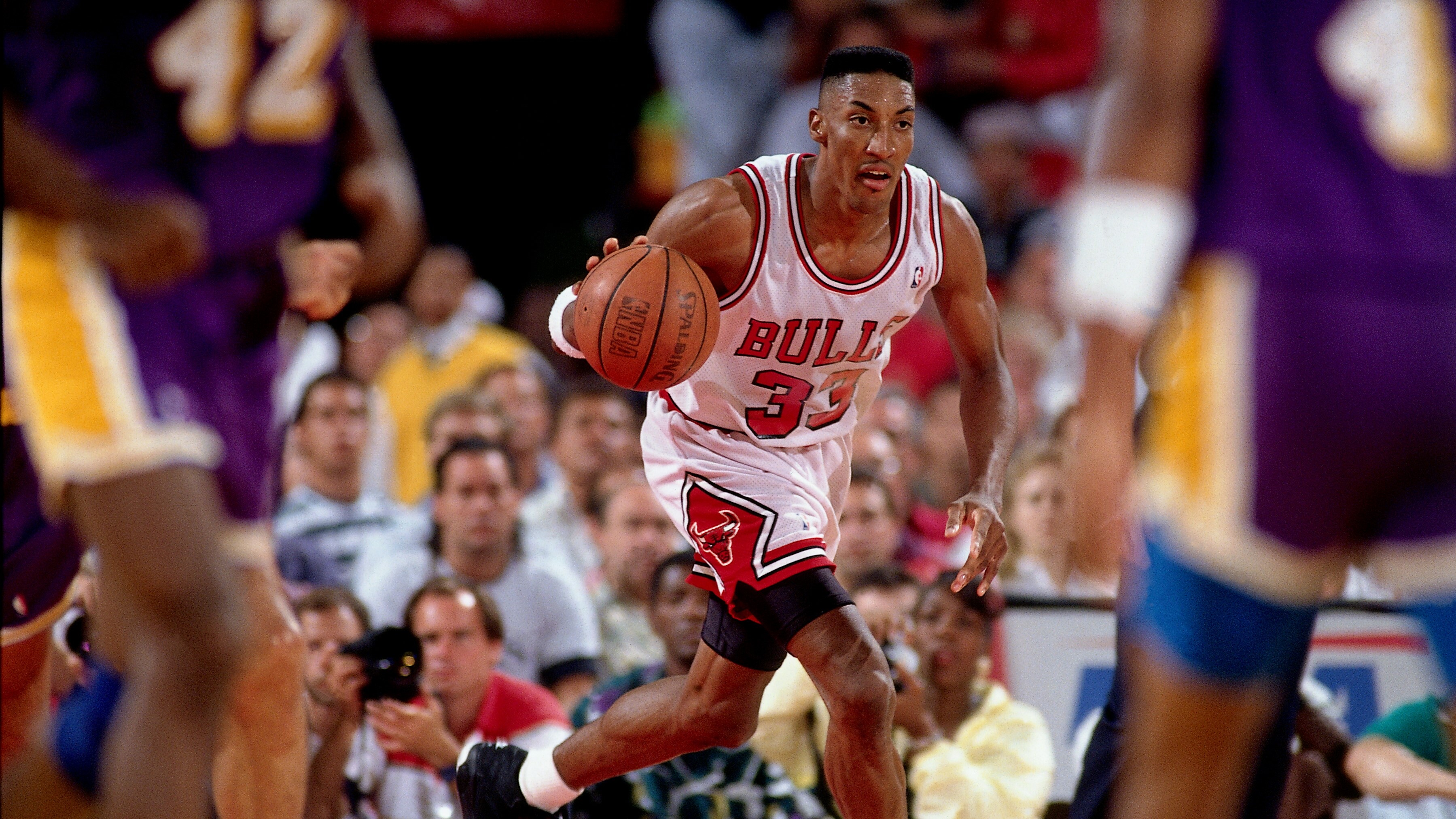
Scottie Pippen #33 of the Chicago Bulls handles the ball in the game against the Los Angeles Laker at Chicago Stadium in Chicago, Illinois, 1990. /VCG
Scottie Pippen #33 of the Chicago Bulls handles the ball in the game against the Los Angeles Laker at Chicago Stadium in Chicago, Illinois, 1990. /VCG
David Kaplan of ESPN 1000 has revealed that Scottie Pippen, who helped the Chicago Bulls win all six of their NBA championships as their second-best player, was "so angry" at Michael Jordan over how he was portrayed in ESPN's documentary "The Last Dance".
Pippen is not alone. His former teammate Horace Grant previously fired off at both Jordan and the documentary, calling the former "a snitch" and the latter "lie, lie, lie." Compared with Grant, Pippen is more famous and, at the same time, more misunderstood.
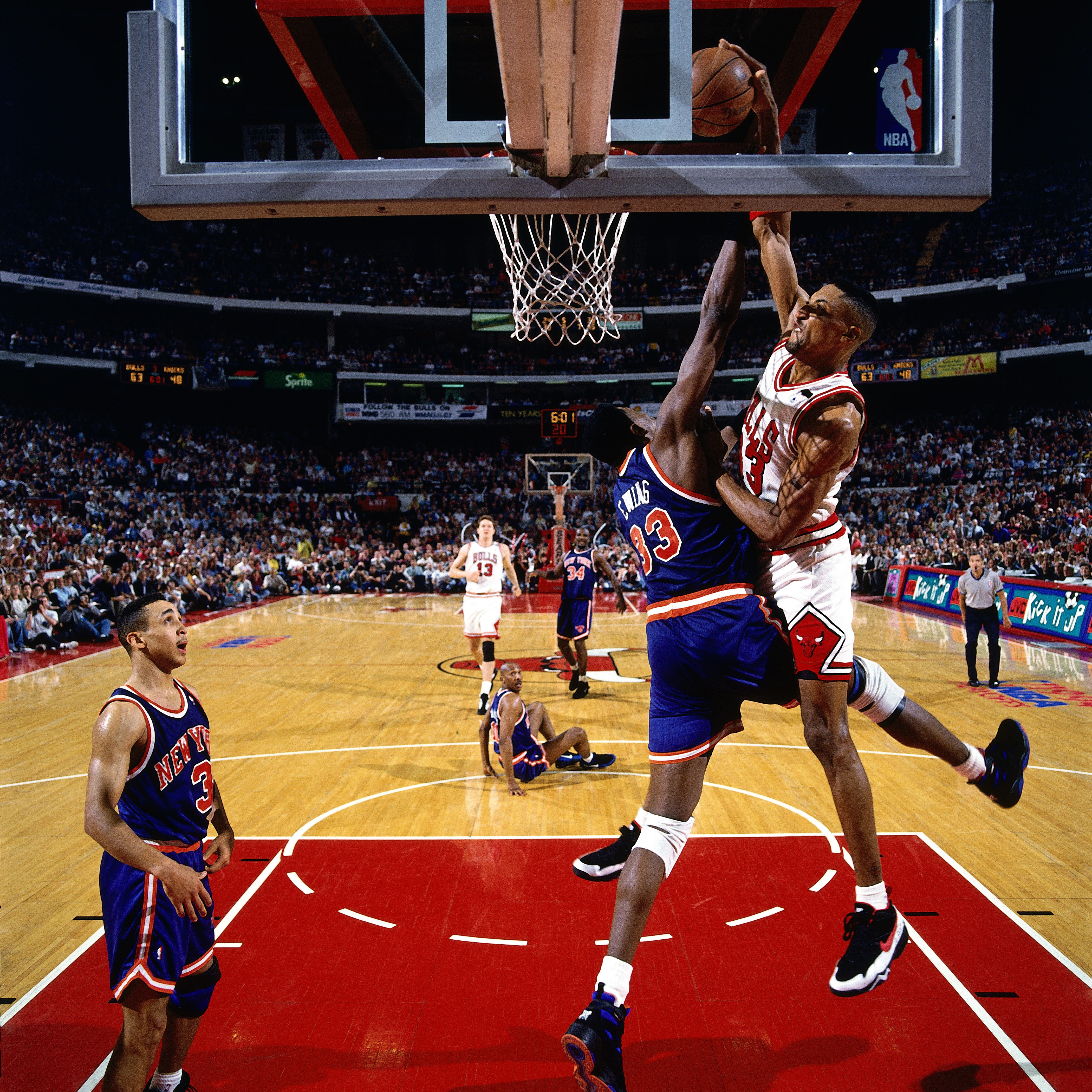
Scottie Pippen (R) of the Chicago Bulls dunks over Patrick Ewing of the New York Knicks in the game at The United Center in Chicago, Illinois, 1994. /VCG
Scottie Pippen (R) of the Chicago Bulls dunks over Patrick Ewing of the New York Knicks in the game at The United Center in Chicago, Illinois, 1994. /VCG
When Pippen joined the NBA in 1987, he was a 2.03-meter-tall, 102-kilogram small forward with remarkable athleticism and guard skills. When he and Jordan were both on the court, Chicago had the league's best early offense pair. Both of them could dribble, pass, shoot and, from time to time, dunk over a seven footer's head.
Though Pippen was never named Defensive Player of the Year (DPOY, neither was Tim Duncan), he was one of the best perimeter defenders in NBA history. Pippen could cover four positions on the court without allowing mismatches unless he was facing monsters like Karl Malone or Charles Barkley. It was hard to trick him with fake moves and you always needed to look out for Pippen's 2.21-meter-long wingspan – he averaged 2.0 steals per game in his career and had six 2+steal seasons.
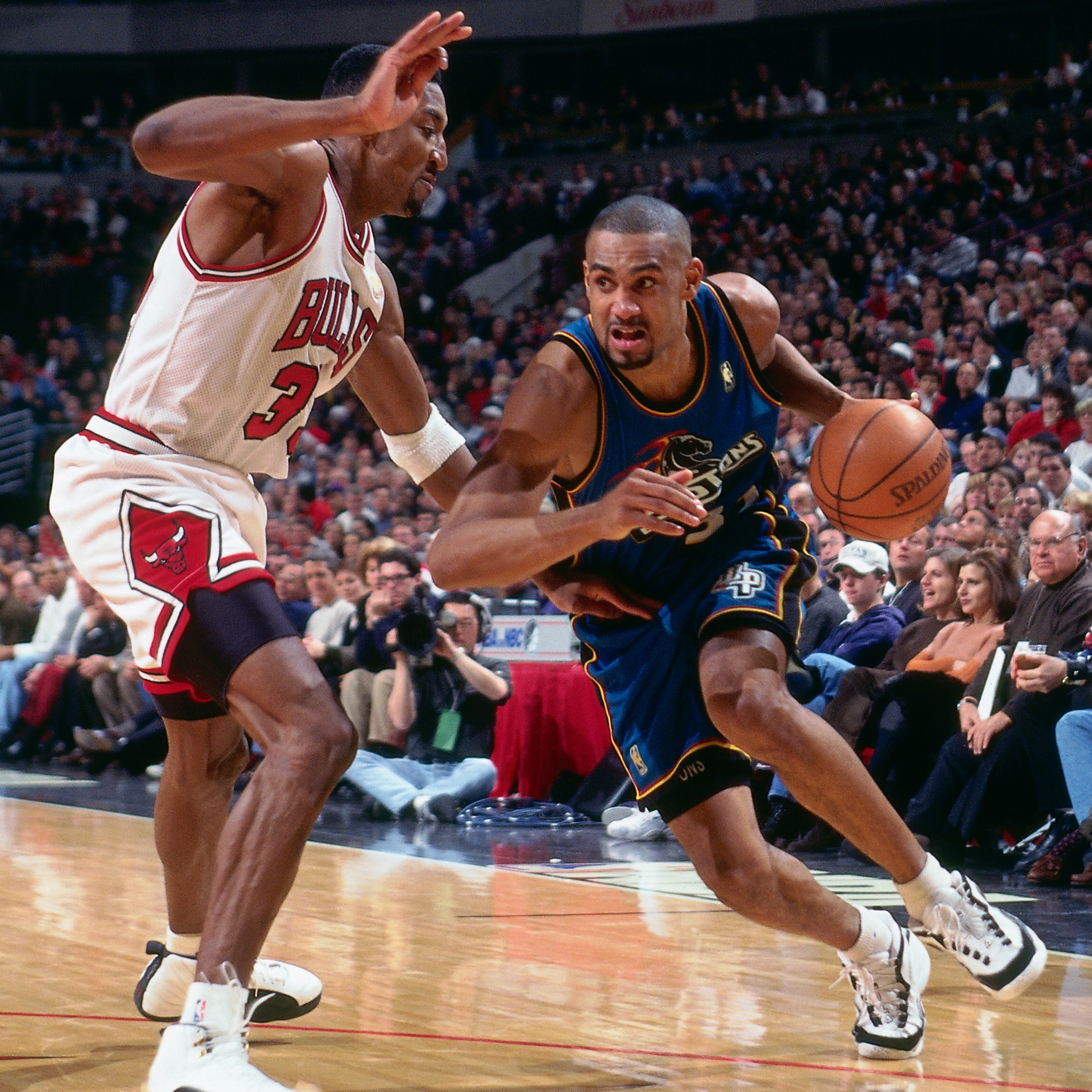
Scottie Pippen (L) of the Chicago Bulls defends Grant Hill of the Detroit Pistons in the game at the United Center, December 25, 1996. /VCG
Scottie Pippen (L) of the Chicago Bulls defends Grant Hill of the Detroit Pistons in the game at the United Center, December 25, 1996. /VCG
Pippen was a perfect team player, too. He had smart off-ball moving, was a great catch-and-shooter. Thanks to his speed and explosiveness, he was quite an offensive threat from the weak side. When Pippen found defensive mismatches against small guards, his size advantage enabled him to score via turnaround fadeaway jumpers. His contributions to team defense was often underrated. Pippen's double teaming, help and switch defense all played important roles in Chicago's signature baseline defensive trap system. He and Jordan could fill every spot between the free throw line and downtown, just like Larry Bird and Kevin Garnett in the Boston Celtics.
However, despite the above merits, Pippen had several weaknesses in offense: he was not a very aggressive slasher – only 3.8 free throw attempts per game in his career; he was not a good free throw shooter either – career free throw rate of only 70.4 percent; his dribble shooting was not threatening enough.
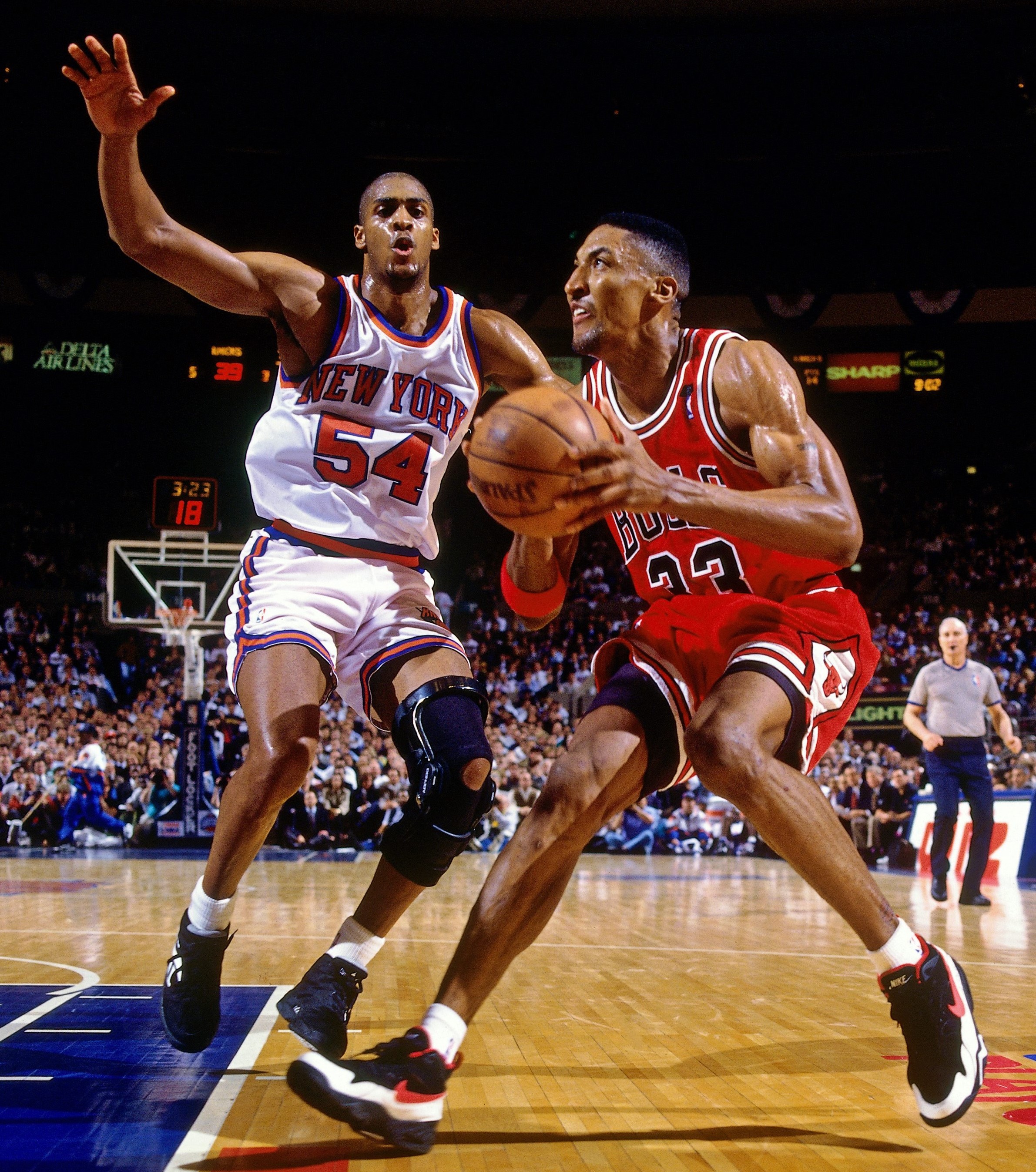
Scottie Pippen #33 of the Chicago Bulls deals with the ball in Game 5 of the Eastern Conference semifinals at the Madison Square Garden in New York City, May 18, 1994. /VCG
Scottie Pippen #33 of the Chicago Bulls deals with the ball in Game 5 of the Eastern Conference semifinals at the Madison Square Garden in New York City, May 18, 1994. /VCG
Simply speaking, Pippen lacked effective killer moves in isolation and that's what set him aside from other forward orchestrators – Rick Barry, Bird, Julius Irving, LeBron James. When the game fell into stalemate and the Bulls needed someone to stand out and change the opponents' defense by himself, Pippen was not their guy.
Many wondered why Pippen never left Jordan and tried to lead his own team. He had his chance in the 1993-94 season while Jordan was playing baseball. Chicago were 55-27, only two fewer wins compared with the previous season when Jordan led them to win the third title. Moreover, Toni Kukoc, Steve Kerr and Luc Longley were added to the franchise.
Then Chicago watched their offense fell from 1993's league No. 2 to 1994's No. 14 and suffered four losses in the Eastern semifinals against the New York Knicks.
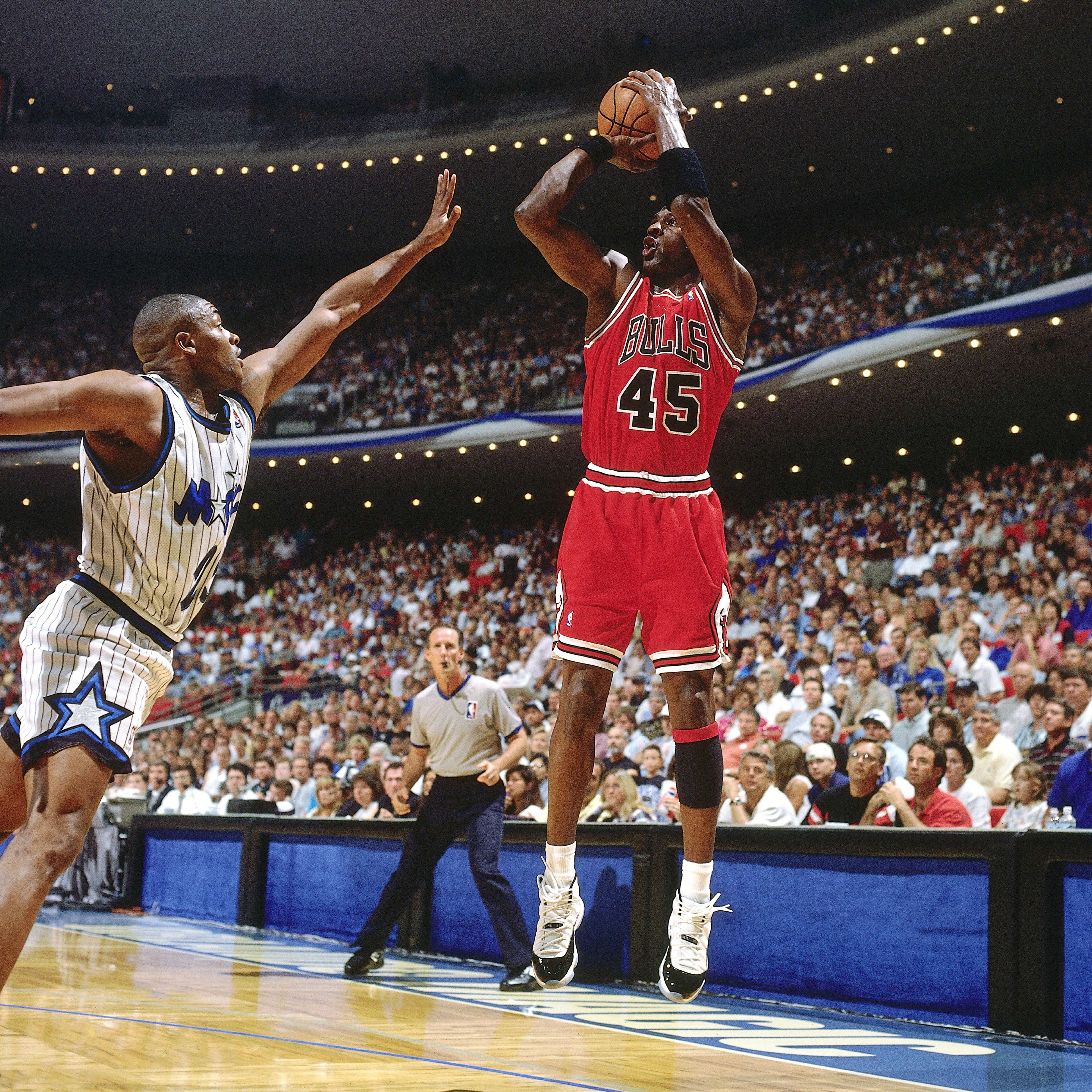
Michael Jordan #45 of the Chicago Bulls shoots the ball in Game 1 of the Eastern Conference semifinals against the Orlando Magic at TD Waterhouse Center in Orlando, Florida, May 7, 1995. /VCG
Michael Jordan #45 of the Chicago Bulls shoots the ball in Game 1 of the Eastern Conference semifinals against the Orlando Magic at TD Waterhouse Center in Orlando, Florida, May 7, 1995. /VCG
One year later, without Grant, the Bulls went 34-31 before Jordan announced "I'm back in mid-March." Then in the following 16 games, the team were 13-4. Back then, Jordan was wearing the No. 45 jersey and was dissed by his opponents who said that he couldn't fly anymore. Nonetheless, he led the Bulls to sweep the Charlotte Hornets 3-0 while averaging 32+7+6+2. Remember the Hornets had Larry Johnson in his best time and 25-year-old, healthy Alonzo Mourning. Both of them were recruited by Team USA in 1994.
It's true that in the following round, Jordan allowed a steal by Nick Anderson which led to a game-winning shot by the Orlando Magic in Game 1. However, Jordan dropped 38 and 40 points in Game 2 and Game 3 respectively. The Bulls lost the six-game series in which Shaquille O'Neal and Anthony Hardaway put down 24+13+4+2 and 19+4+8, but Jordan's stats were 31+7+4+3+2 with an FG rate of 48 percent.
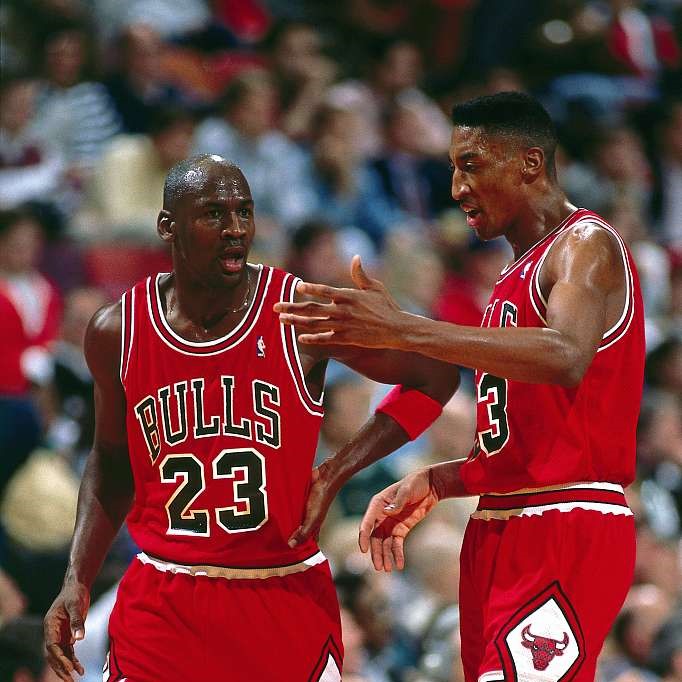
Michael Jordan #23 and Scottie Pippen of the Chicago Bulls communicate in the game against the Houston Rockets at The Summit in Houston, Texas, 1990. /VCG
Michael Jordan #23 and Scottie Pippen of the Chicago Bulls communicate in the game against the Houston Rockets at The Summit in Houston, Texas, 1990. /VCG
That's what Jordan meant to Chicago, what Pippen could not give his team, and the decisive factor that kept Pippen from becoming a true leader: game-changing individual offense.